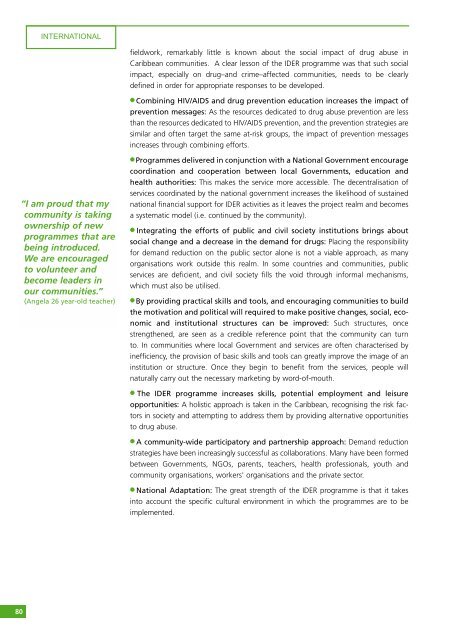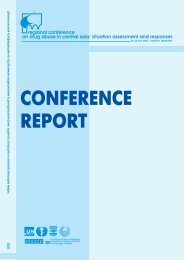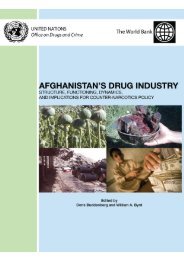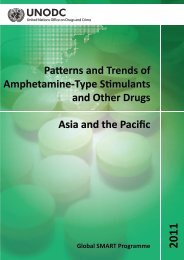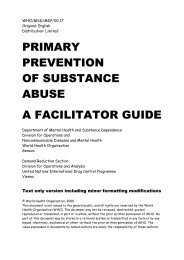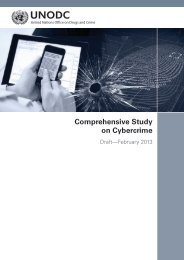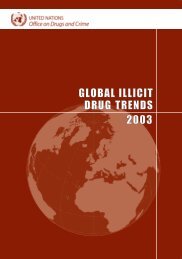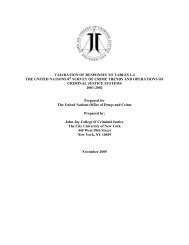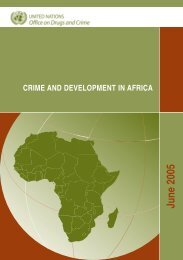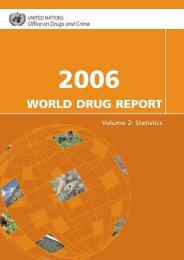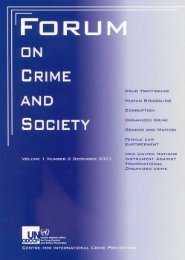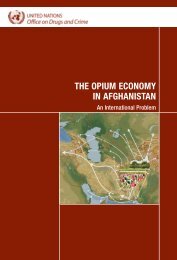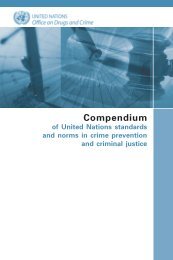PDF (Lessons learned in drug abuse prevention: a global review)
PDF (Lessons learned in drug abuse prevention: a global review)
PDF (Lessons learned in drug abuse prevention: a global review)
Create successful ePaper yourself
Turn your PDF publications into a flip-book with our unique Google optimized e-Paper software.
INTERNATIONAL<br />
fieldwork, remarkably little is known about the social impact of <strong>drug</strong> <strong>abuse</strong> <strong>in</strong><br />
Caribbean communities. A clear lesson of the IDER programme was that such social<br />
impact, especially on <strong>drug</strong>–and crime–affected communities, needs to be clearly<br />
def<strong>in</strong>ed <strong>in</strong> order for appropriate responses to be developed.<br />
● Comb<strong>in</strong><strong>in</strong>g HIV/AIDS and <strong>drug</strong> <strong>prevention</strong> education <strong>in</strong>creases the impact of<br />
<strong>prevention</strong> messages: As the resources dedicated to <strong>drug</strong> <strong>abuse</strong> <strong>prevention</strong> are less<br />
than the resources dedicated to HIV/AIDS <strong>prevention</strong>, and the <strong>prevention</strong> strategies are<br />
similar and often target the same at-risk groups, the impact of <strong>prevention</strong> messages<br />
<strong>in</strong>creases through comb<strong>in</strong><strong>in</strong>g efforts.<br />
“I am proud that my<br />
community is tak<strong>in</strong>g<br />
ownership of new<br />
programmes that are<br />
be<strong>in</strong>g <strong>in</strong>troduced.<br />
We are encouraged<br />
to volunteer and<br />
become leaders <strong>in</strong><br />
our communities.”<br />
(Angela 26 year-old teacher)<br />
●Programmes delivered <strong>in</strong> conjunction with a National Government encourage<br />
coord<strong>in</strong>ation and cooperation between local Governments, education and<br />
health authorities: This makes the service more accessible. The decentralisation of<br />
services coord<strong>in</strong>ated by the national government <strong>in</strong>creases the likelihood of susta<strong>in</strong>ed<br />
national f<strong>in</strong>ancial support for IDER activities as it leaves the project realm and becomes<br />
a systematic model (i.e. cont<strong>in</strong>ued by the community).<br />
● Integrat<strong>in</strong>g the efforts of public and civil society <strong>in</strong>stitutions br<strong>in</strong>gs about<br />
social change and a decrease <strong>in</strong> the demand for <strong>drug</strong>s: Plac<strong>in</strong>g the responsibility<br />
for demand reduction on the public sector alone is not a viable approach, as many<br />
organisations work outside this realm. In some countries and communities, public<br />
services are deficient, and civil society fills the void through <strong>in</strong>formal mechanisms,<br />
which must also be utilised.<br />
● By provid<strong>in</strong>g practical skills and tools, and encourag<strong>in</strong>g communities to build<br />
the motivation and political will required to make positive changes, social, economic<br />
and <strong>in</strong>stitutional structures can be improved: Such structures, once<br />
strengthened, are seen as a credible reference po<strong>in</strong>t that the community can turn<br />
to. In communities where local Government and services are often characterised by<br />
<strong>in</strong>efficiency, the provision of basic skills and tools can greatly improve the image of an<br />
<strong>in</strong>stitution or structure. Once they beg<strong>in</strong> to benefit from the services, people will<br />
naturally carry out the necessary market<strong>in</strong>g by word-of-mouth.<br />
● The IDER programme <strong>in</strong>creases skills, potential employment and leisure<br />
opportunities: A holistic approach is taken <strong>in</strong> the Caribbean, recognis<strong>in</strong>g the risk factors<br />
<strong>in</strong> society and attempt<strong>in</strong>g to address them by provid<strong>in</strong>g alternative opportunities<br />
to <strong>drug</strong> <strong>abuse</strong>.<br />
● A community-wide participatory and partnership approach: Demand reduction<br />
strategies have been <strong>in</strong>creas<strong>in</strong>gly successful as collaborations. Many have been formed<br />
between Governments, NGOs, parents, teachers, health professionals, youth and<br />
community organisations, workers' organisations and the private sector.<br />
● National Adaptation: The great strength of the IDER programme is that it takes<br />
<strong>in</strong>to account the specific cultural environment <strong>in</strong> which the programmes are to be<br />
implemented.<br />
80


